Summary 
Superb black box production features a silent narrator-storyteller Clown that drives the action and a charming portrayal of the plucky Helena that provides considerable heart. Modernized but staged with an old reel camera that provides silent-movie written narration. An intimately staged production of a difficult text, this is a love story with complex characters, told with ingenuity, intelligence, and ample humor.
Design
Directed by Amanda Dehnert. Set by Christopher Acebo. Costumes by Linda Roethke. Lights by Dawn Chiang. Compositions and sound by Fabian Obispo. Fights by Christopher DuVal.
Cast
Armando Duran (The Clown), Kjerstine Rose Anderson (Helena), Danforth Comins (Bertram), John Tufts (Parolles), Dee Maaske (Countess of Rossillion), G. Valmont Thomas (LaFew), James Edmondson (King of France), Kate Mulligan (The Widow), Emily Sophia Knapp (Diana).
Analysis
Amanda Dehnert's intimate but ambitious All's Well That Ends Well is an often brilliant production creatively mounted within the Oregon Shakespeare Festival's tiny black-box New Theatre. Dehnert's stage is both inventive and charming, with a barren tree - with big overhanging branches - looming upstage. Scattered autumnal leaves drift on the thrusting stage and are scattered upon the floor around the seats. A wooden swing hangs from one limb, and a clothes line from another. A large white linen sheet hangs from the line, suggesting drying laundry but also serving as a projection screen for the old-fashioned reel camera that rests downstage opposite a record player among trunks and packing boxes. The planks that comprise the stage end in uneven slats downstage.
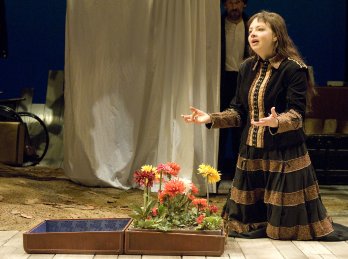
Kjerstine Rose Anderson's Helena strikes the perfect balance of pluck and perseverance along with girlish appeal. She begins the play at the Count Rossillion's funeral, placing flowers over his grave, in a light rainfall, trying to cover her head with a magazine while the other characters carry umbrellas. She teases Bertram, who gallantly uses his umbrella to protect her, sidling away so he must follow her. Anderson's Helena is moved to tears when Bertram's departure for court is announced, and he again pays her attention, comforting her by taking her hand and offering the flower from his lapel as they leave the funeral service. Anderson charms from the beginning, appearing bohemian with very long hair and wearing an overcoat, boots, and a bulky jacket. She climbs the tree with athletic ease, reclining for a reflective moment before hanging upside down and reaching out to playfully tap Reynaldo with her foot. Her Helena brims with confidence and personality, a superbly played core for Dehnert's tightly knit production.
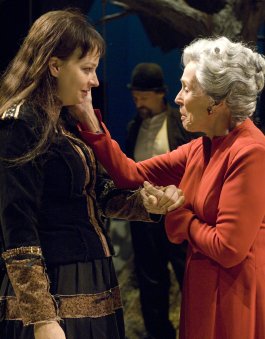
Dehnert ingeniously employs an unnamed, hobo-like Clown to serve as narrator and comic relief, as well as to play a series of roles from Reynaldo to one of the Brothers Dumaine. Armando Duran's silent Clown is an omnipresent Chorus, smiling and likeable, an old-time storyteller recounting in mime and with visual aids the delightful love story. The goateed Clown appears before the production begins - wearing a ski cap, a tattered coat, and big boots - to join pre-performance prohibitions, wagging his finger to scold the audience for a ringing cell phone. He lays out a military jacket and pointedly gestures to Bertram's prized ring, then plays a phonograph record and pulls the white sheet taut. Duran's Clown gestures toward the camera, which immediately comes on and projects silent-movie style narration cards on the white sheet. The written narration - e.g., "Meanwhile...in Rossillion" or "Spring has come" - is also projected on screens high above either side of the stage to accommodate the side seating - and cleverly provides background information and story details throughout the production. The magical Clown cues the rain and lightning effects, both at the beginning and for Parolles' first appearance, as well as starts and stops the projector with just a wave of his hand.
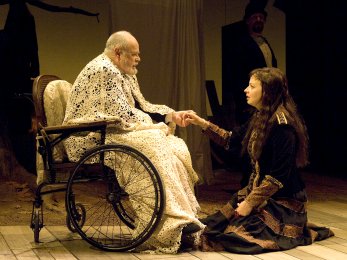
Dehnert presents supporting characters with memorable flair. The coward Parolles, wearing slicked-forward black hair, sports flood pants with a tuxedo in his appearance at court. The bespectacled and elderly King, wearing a white shawl over his shoulders, huddles in a wheelchair. The handsome Bertram, focused and ambitious despite his demonstrated affection for Helena, is a preppie soldier with a sweater tied over his shoulders, and he addresses the King with confidence while Parolles cowers up the tree. Later, he pores over a pile of animal husbandry textbooks, looking collegiate in a kerchief and an upturned collar as Parolles paces in a black and white striped sweater, white slacks, and black shoes. And the uniformed LaFew, rigid and serious, points to his eyes then at Parolles to give the coward an "I'm watching you" warning.
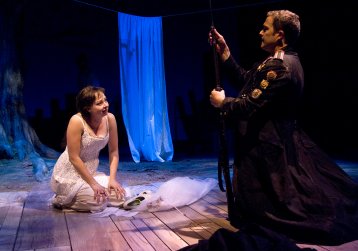
After the Clown signifies the arrival of spring by opening an unwieldy suitcase at center stage to reveal an array of colorful flowers, Helena displays her determination to win Bertram - "he must not be my brother!" - by hiding her big coat with a gentleman in the front row of the audience. After the Countess provides something of a blessing by taking her hand, Anderson's spirited Helena yanks her black medical bag from an onstage trunk, retrieves her coat from the front row, and rushes off to the ailing King. She reveals some endearingly uncharacteristic trepidation in the presence of royalty, running away before entering, then squirming in fear before attempting to flee again. The Clown, as the King's attendant, warmly blocks her escape, and after she sprawls facedown in subservience, counsels her with breathing exercises - in, out; in, out - as she musters her courage. Anderson charms again, her Helena quickly displaying an array of potions and flasks and bowls, squealing with delight when the King acquiesces to her pleas, then curing him as if casting a benevolent spell. In lime green light and a humming sound effect, her medical book appears to levitate in a slick magic trick, and when the healed King reaches a grateful hand to her, Anderson's Helena sprints and knee-slides to his side.
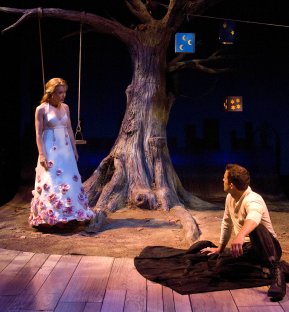
The pivotal selection scene features the rejuvenated King strutting onstage in a royal robe that displays an ostentatious map of France. Helena - exuberant and suddenly feminine in a wispy gown, ear rings, and bracelet, but with a tattoo visible on her back - gives an endearingly excited "Hi!" with a rapid wave to Bertram. Speeding the scene, Duran's Clown portrays all of the eligible bachelors in turn, a stunningly schizophrenic sequence in which he invests each with distinctive personality: he jumps up and down and waves in excitement as one, then twirls and poses and winks as another. When Bertram's smile fades at his selection - "whoa whoa whoa!" after turning to look behind him when Helena gestures - Helena is so wounded she cannot bear to look at him, and her dejected bearing when the King forces them together is heart wrenching. Anderson's Helena slumps and barely holds onto what would be her bridal bouquet as Bertram sends her "home," albeit with a gentle kiss. Bertram's rejection of Helena stems not from a lack of affection - because he often shows the deepest of feelings - but in his prioritization of military and political ambitions.
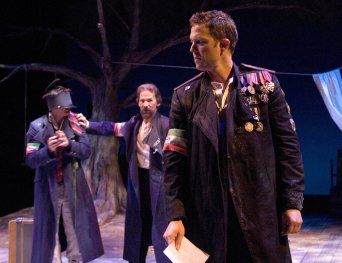
Dehnert brings intermission with an insightful image. At war in Florence, Bertram is led by the Clown doubling as the Duke, an army officer who hands him a rifle - and Parolles just a drum - as gunfire pounds in the distance. Once in combat, Bertram falls to his knees with blood on his face, his fellow soldiers upstage. Helena, back in France, mirrors his movements, tearing the train from her dress as she resolves to follow her love across the border, and she kneels before Bertram and they face each other poignantly, though countries apart. With "Intermission" remaining on the projection screens, early twentieth-century ragtime piano jangles as the Clown returns and drains his large cup of carryout coffee. The music fades as Duran's Clown closes the record player then sings - "o solo Mio" - while playing an accordion as action shifts to Florence.
Apart from the humiliation of Parolles by the Brothers Dumaine - doubled by the Clown and LaFew - Dehnert's second act is dominated by the Widow and Diana, an eye-candy mother and daughter pair of vixens, both wearing sunglasses, floppy hats, and strappy high-heels, Diana licking at a lollipop. They are joined by Anderson's Helena, now the dirt-smeared Pilgrim in disguise, pig-tailed, bare-foot and wearing the rags of her dress. The soldiers march past in yet another ingenious stage picture from Dehnert: the Clown's Duke doggedly leads the march, wielding his rifle, but there are only two other soldiers spanning the depth of the stage, the rest signified by cardboard cutout military men dangling from a tether between the actual soldiers.
Dehnert portrays the humiliation of Parolles as a comic comeuppance but more importantly as a vivid life-lesson for both he and Bertram. The blindfolded Parolles - he trips over a chair, stabs at it with his sword, then flees headfirst into a tree - is deceived by the Dumaines' use of a gibberish foreign tongue - they refer to the Duke as "the Duck of Florence" - and they march him in a lurching stumble right into the front row of the audience. His feet bound by his own necktie, Parolles reveals military secrets to his interrogators as the stunned Bertram observes. Later, the humbled Parolles re-emerges, now bedraggled and apparently burdened with foul body odor, his hair wildly awry, but when he is given pocket change and sent to a shelter for a meal, he thankfully returns the money. And when Bertram is caught in his own web of lies, much like Parolles was, referring to Diana as just "someone I have sometimes...laughed with," he endures a self-realization. Faced with Helena's pregnancy and his own ring, he backs up, shakes his head, and starts to weep. Bertram then kneels before Anderson's Helena, and she of course kneels in response, and they tenderly embrace to LaFew's "mine eyes smell onions" remark.
Dehnert's second act maintains the production's charm and ingenuity, and is enhanced by a slew of wonderful moments: the ladies journey to the French court with five oversized suitcases; the Clown honks like a waiting taxi cab; a beautiful snowfall appears upstage as the pregnant Helena leans wearily against a street sign; the petite Diana struggles to carry all the bags; and the Clown as a speed-walker messenger in a numbered jersey delivers the ladies' message to the King, then stretches out a hamstring and checks his neck pulse.
But the All's Well story is Helena's, and the heart of this production is the enchanting Anderson. Her pluck and resolve resonate, and to her credit the love between her Helena and Bertram is deeply rooted and completely plausible. Dehnert concludes the production with a silent home-movie epilogue, as the Clown lowers the lights and plays a Helena and Bertram finale on the upstage sheet. Helena is seen cradling her baby in fuzzy black and white images taken from a hand-held camera, then Bertram is seen, years later, playing with the toddler boy. The home-video montage continues with images of Helena and Bertram in wedded bliss, their son changing from toddler to teenager to young man. In a final, heartwarming image, their son is seen as a grown man at their home, sadly bringing flowers to their graves. Sometimes charming, sometimes poignant, Dehnert's intimate production is always cleverly staged, and after the final moving moments, the audience lingers for a well-deserved standing ovation.